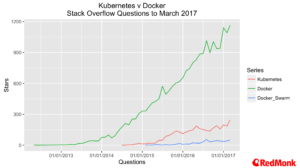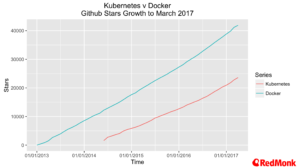TL; DR – Docker is creating the necessary partnerships to gain a significant foothold in the enterprise. The focus on developers remains as relentless as ever.
We attended DockerCon in Austin, Texas earlier this month. As an event DockerCon has grown at a phenomenal pace, with this year’s event going past five thousand attendees, a far cry from the five hundred attendees of 2014. The attendance profile has changed substantially over the events I have had the pleasure of attending, with the average age increasing (we commented during the event that the average age seemed to have gone up by five years) and overall a more enterprise feeling at the event. That said developers were still a significant, perhaps even the majority, of attendees.
Looking purely from an analyst perspective, the first DockerCon I attended had three analysts in attendance, this one had between fifteen and twenty, the majority of whom are exclusively focused on enterprise buyers. While not in any way an accurate benchmark, there are events in the infrastructure space with multiples of this level of analysts in attendance with limited enterprise opportunities, it is still an interesting reference point.
The juxtaposition between community and enterprise is one which Docker must balance on a number of fronts, their main conference being one of them. In our conversations with Docker they made it clear they have no plans to run two separate events, rather they will run “summits” alongside their main conference. On a personal level I welcome this, it makes for more interesting content, but there is an inherent risk in this strategy – in trying to please everyone you may please no one.
The Enterprise Cometh
You cannot underestimate the importance of the @oracle announcement to @docker enterprise adoption #DockerCon
— Fintan Ryan (@fintanr) April 19, 2017
Docker have been working steadily over the last few years to build strong enterprise relationships, and when it comes to the enterprise the big three are IBM, Microsoft and Oracle. The announcement of Oracle offerings within the Docker Store marks a significant moment in this evolution.
There are few companies more associated with the enterprise than Oracle, and whatever your opinion of the company, they bring a level of validation in the minds of many CIOs that is hard to replicate with other relationships. From Oracles perspective, this is a necessary step in reaching a new generation of developers – bluntly put Oracle are far from the first name which comes to mind for many developers starting out on greenfield projects. This is something Oracle are actively trying to address, and the Docker relationship is just one facet of their overall strategy.
Key take away from #DockerCon – Docker now have strategic relationships with @IBM, @Oracle, @Microsoft – gateways to every enterprise
— Fintan Ryan (@fintanr) April 19, 2017
During DockerCon we had the opportunity to sit down with representatives of all three companies to discuss their differing offers and focus areas, and all were keen to note their ongoing commercial relationships with Docker, albeit with their own commercial goals first and foremost in the conversations.
Overall these commercial relationships are a net positive for Docker in the enterprise.
The Cloud Has Already Arrived
Docker also highlighted their integrated offerings for AWS and Azure (Docker for Cloud Providers). There are future offerings planned for GCP, and, significantly, Alibaba Cloud.
For net new applications getting these integrated offerings in place is key. Both the AWS and Azure offerings are offered and billed through their respective marketplaces, which great simplifies procurement for many organisations. That said, the biggest challenge, currently, in this space for Docker, as it is for their competitors, is ECS from Amazon.
The Evolving Security Story
Docker are making some solid moves in the security space, from code provenance, to secrets management to incremental improvements in providing end to end encryption and signing when using Docker Swarm. These are also difficult concepts to explain succinctly to an enterprise audience, and are aspects often ignored by developers.
This is not to say that Docker are the only people in the ecosystem working on these problems, very far from it – as we noted recently when it comes to “cloud native we need to look at several interlinked concepts – with immutable infrastructure, infrastructure as code, vulnerability scanning approaches, container registries, secrets management, network management and scanning, and source code provenance being among the most important”. There is a lot more work to happen in this space, and no one vendor covers each of these bases.
The Docker security story is becoming full formed and opinionated, & makes it easy for devs to do the right thing. This is good. #DockerCon
— Fintan Ryan (@fintanr) April 18, 2017
Docker are, however, focusing on bringing together an integrated story. There is a way to go but the story has matured, a lot, over the last eighteen months. The overall competition around security from all the vendors in the space is a good thing, and will benefit developers over the longer term.
The Legacy App Footprint
Docker announced their app modernization programme, which is a combination of a software offering and a professional services ecosystem play. We have mixed feelings here – if the focus is truly on assisting customers in modernizing their apps and infrastructure, this makes for a compelling story. But the true value here is modernizing all the processes around development and operations, not just leveraging containers as a deployment mechanism. Simply migrating virtual machine images to containers is a less compelling story.
As we have noted before viewing containers as a replacement or upgrade for virtual machines, really misses both the point and opportunity of containers. We do feel there is a significant risk that Docker may find themselves getting pigeon holed as VM replacement if customers focus solely on lift and shift work.
Economic factors will only take you so far in establishing a meaningful relationship with a company, and if clients view your value add as solely being around cost reduction you will ultimately become a commodity.
LinuxKit and The Moby Project
During the day one keynote Docker CTO Solomon Hykes announced two new projects, LinuxKit and Moby.
Changing Stakeholders
Before we discuss these two announcements it is important to understand the wider world Docker now find themselves operating in, something which CEO Ben Golub was very keen to emphasize from the outset of the conference.
Docker CEO @golubbe keen to talk up the changing stakeholder base #Dockercon pic.twitter.com/lSZzGYyNjs
— Fintan Ryan (@fintanr) April 18, 2017
The changing nature of your stakeholders is a challenge that companies which emerge from any successful open source project must deal with, and Docker is no exception to this. This will not be the last move they make that will upset certain sections of their community. From Docker, the company’s, perspective this is a risk worth taking.
LinuxKit
LinuxKit is a system for building a minimised Linux subsystem with a very small footprint and attack surface. That is the micro description. The macro description is LinuxKit is a way to remove the consideration of what the underlying Linux. and the underlying architecture, is and focus on what is running in containers.
LinuxKit has the potential to be highly disruptive, but it is important to note that it is very early days for its use beyond Docker itself. That said, if properly targeted LinuxKit could easily disinter-mediate a number of operating system vendors. The Docker on AWS offering is already an example of this.
Moby
The big announcement of the day one keynote was The Moby Project. At its core this is a separation between the commercial Docker offering and the wider community project. Docker the product will be built from Moby the project. This is a step that Docker has needed to take for a while.
Now the move from docker/docker to moby/moby has undoubtedly ruffled feathers in many locations, and there is no doubt it could have been handled better. Docker as a company love a big unveil during their keynotes, and in announcing Moby in this manner many people lost sight of the fact that discussions about the move have been ongoing for several months among Docker maintainers. It is worth reading the comments of Darren Shepard from Rancher Labs for some more nuanced context.
The Developer Momentum Question?
Developer choice is the way the world is going now << @solomonstre channeling @redmonk 🙂 #DockerCon
— Fintan Ryan (@fintanr) April 18, 2017
There has been a lot of commentary recently about where the developer conversation is around containers, with many people boiling it down to a discussion between Docker and Kubernetes. This either/or view of the world is mistaken, particularly at what is still such an early stage in a fundamental shift in how applications are developed.
For now, however, Docker still has a clear lead, especially in terms of questions on Stack Overflow. It is worth taking note of just how active the Kubernetes slack channels and mailing lists are, which is undoubtedly reducing the number of questions on Stack Overflow.
Now let us be clear here, there is no clear correlation between questions about Docker and the ultimate deployment platform, but it is fair to say that developers are still talking, a lot, about Docker.
Conclusion
There are several areas to be positive on – the various commercial relationships, the security story, the additional definition on what is community versus what is a commercial offering. There are concerns about the reaction of members of the community to the Moby project and the impact this could have on adoption.
Outside of all this the wider questions remain, Docker have created a technology that is wildly popular with developers – crossing the chasm to far wider adoption in the enterprise, and picking up some of the associated revenue, remains a much harder challenge.
Disclaimers: Docker paid for my T&E. Docker, IBM, Oracle and Microsoft are current RedMonk clients.


No Comments